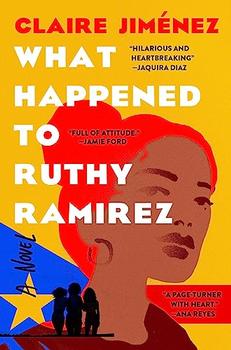Summary | Excerpt | Reading Guide | Reviews | Beyond the Book | Readalikes | Genres & Themes | Author Bio

But I knew.
For years I argued with Jessica about whether Ruthy'd run away or whether somebody had taken her. For me it was clear that Ruthy had simply left. The morning she disappeared, Ma had yelled at her for the fifteenth time for not bothering to properly clean the bottom of the caldero when it was her turn to do the dishes, and Ruthy had shaken her head and muttered underneath her breath, "I can't wait to get out of here."
"Look, even her favorite shirt is missing," I would say. To which Jessica would whisper, "Don't be saying that shit in front of Mom, Nina. You hear me? Because I will kick your ass."
There were no clues in the diary Ruthy left.
Just her bubbly shaped script describing kicking it with her best friend Yesenia, several page-long takedowns of the teachers she hated, and then a couple of moments of infighting with the crew of girls she hung out with at school. A poem. A few raps that sounded suspiciously like Left Eye's part in "Waterfalls." One brief breakup with Yesenia, in which Ruthy called her "a fake corny bitch," and then numerous passages in which she made fun of me and Jessica. "Poor Nina, she's got no rhythm. It's like the girl, she was adopted." Or: "Jessica needs to stop plucking her eyebrows so thin. It makes her forehead look extra big." There were descriptions of our childhood fights, sometimes lists of rules: if you fall off the bed while wrestling and don't get up, you lose; if you blink in a staring contest (even if it was because you had to sneeze), you lose; if you cry while getting roasted by one of your sisters, then, oh Lord, were you finished! Crying was a mortal sin in the Ramirez house. The ultimate sign of weakness.
In Ruthy's journal, there were no suspicious boyfriends or predatory grown-up men. No kindly male mentors with hidden agendas. Just pages of her logging in how fast she ran that day during track practice or descriptions of the pale green hamburger she forced herself to eat during lunch.
Our father waited at the precinct after work every day for a month, with his puffy leather coat folded in his hands over his lap, not for good news (my father was a pessimist) but to make sure the cops did not forget us.
"They got to know that we're watching. And that people care about her," he'd say, his head bent to the plate as he shoveled rice into his mouth late at night, long after all of us had already eaten.
The cops had suspected him at first. Dad knew they looked at him like he was a piece of shit, until they called his boss who confirmed that he'd been working overtime, a late shift, the night that Ruthy disappeared.
Still, it broke my father's heart.
That somebody could think that about him, and those types of rumors, they don't ever go away.
Our mother, shocked, spent large amounts of time stuck at the kitchen table. And if outside people or one of the extended family became restless or moved around the house to clean or to cook, or if people wanted to take her out to dinner or to a movie to cheer her up, my moms would tell whatever people, "Why don't you sit the fuck still?"
"Pues, stay still, then!" people started to say, the church folks especially—who'd always looked down on her for being thirty-two with three daughters, for having the first kid when she was just seventeen—they left my mother alone. Even after the gossip and the heartbreak finally killed my father five years later, these people, they kept on whispering. "Besides, you can only sympathize so long for somebody else's loss before you run out of encouraging things to say." So my mother stood still.
For many years. By herself.
So that she blew up like a balloon, eleven different sizes.
And what did I do?
That little fourth grader sitting at the kitchen table with minimal math skills and no rhythm, surrounded by her scattered handouts, squinting through Coke-bottle glasses?
Excerpted from What Happened to Ruthy Ramirez by Claire Jimenez. Copyright © 2023 by Claire Jimenez. Excerpted by permission of Grand Central Publishing. All rights reserved. No part of this excerpt may be reproduced or reprinted without permission in writing from the publisher.
Your guide toexceptional books
BookBrowse seeks out and recommends the best in contemporary fiction and nonfiction—books that not only engage and entertain but also deepen our understanding of ourselves and the world around us.